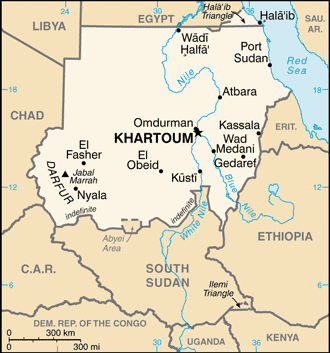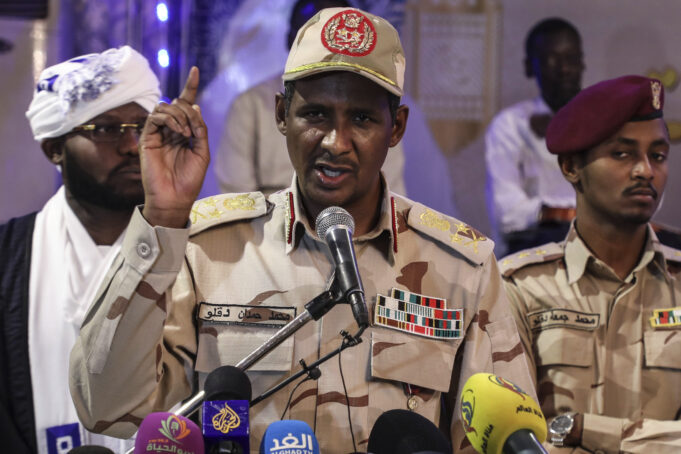General Mohamed Hamdan Dagalo (also known as Hemedti), head of Sudan’s feared Rapid Support Force, pledged over $1 billon to help stabilize the Sudanese Central Bank after an economic crisis and overwhelming protests which led to the military ouster of President Omar el-Bashir in 2019.
His promise two years ago is a sign of how Sudan’s military coup leaders have used their positions to enrich and empower themselves—and explains why they seek to stay in power. They exert tremendous control and enjoy wealth as a result of their positions and ability to rule.

“We put $1.027 billion in the Bank of Sudan … the funds are there, available now,” said the general, who is part of the ruling regime, in 2019. And, he added, the RSF “supported the state at the beginning of the crisis by buying the essential resources: petrol, wheat, medication.”
“People ask where do we (the RSF) bring this money from? We have the salaries of our troops fighting outside (abroad) and our gold investments, money from gold, and other investments,” he said in widely distributed media reports.
According to an article last year by financial news outlet Bloomberg, the general has been accused of stealing. “A company linked to Sudan’s most powerful militia leader (Dagalo) is surrendering a network of mines that at one stage produced a third of the nation’s gold, as his group battles accusations of corruption and brutality.”
Global Witness, a non-profit that investigates environmental and human rights abuses and tracks “ill-gotten money and influence through the global financial and political system,” has commented on Dagalo’s rise. Part of his power stems from control of the “Jebel Amer gold mines in Darfur, and a gold trading company frequently referred to as Al Junaid. (Letters from the organization indicate that the company group refers to itself as Al Gunade—the same pronunciation but different spelling.),” said Global Witness.
His partial hold on Sudan’s vital gold industry illustrates the scale of the challenge to rescue an economy broken by decades of mismanagement, corruption and war. Included in that challenge is the 2011 loss of much needed oil revenue with succession and independence for Southern Sudan, the world’s newest nation state.
“His career began as a militia man in western Darfur, where rebels took up arms against Khartoum in 2003. Bashir mobilized several militia to quell the revolt and, in the conflict that followed, some 300,000 people were killed and two million more driven from their homes. The government disowned ‘outlaw’ fighters who murdered civilians, but the International Criminal Court issued an arrest warrant for Bashir for war crimes and the U.S. imposed further economic sanctions against his government,” observed Reuters news service.
According to the European Council On Foreign Relations, “The civilian wing of the Sudanese state is bankrupt but unwilling to confront powerful generals, (including Dagalo and General Abdel Fattah al-Burhan, head of the governing Sovereign Council) that control a sprawling network of companies and keep the central bank and the Ministry of Finance on life support to gain political power.”

“The military and security apparatus has shares in, or owns companies involved in the production and export of gold, oil, gum arabic, sesame, and weapons; the import of fuel, wheat, and cars; telecommunications; banking; water distribution; contracting; construction; real estate development; aviation; trucking; limousine services; and the management of tourist parks and events venues.
“Defence companies manufacture air conditioners, water pipes, pharmaceuticals, cleaning products, and textiles. They operate marble quarries, leather tanneries, and slaughterhouses. Even the firm that produces Sudan’s banknotes is under the control of the security sector.”
Dagalo’s influence increased when his RSF joined the Saudi Arabian and United Arab Emirate-led 2015 military intervention in Yemen.
“Members of the RSF were deployed in Yemen and received support from Saudi and UAE including money and weapons,” reported Al Jazeera.
A 2019 British Independent headline read: “ ‘It’s our biggest employer: How a lucrative war in Yemen fuels conflict in Darfur,’” Members of Dagalo’s militia, in a six-month deployment, earned roughly $20,000—more money than they could ever hope to earn in a lifetime, according to the Independent.
The Independent reported Darfur residents say years of wealthy, armed and trained fighters returning from Yemen has ratcheted up tensions in a region torn by continuous years of civil unrest.
Many fear it has unnaturally swelled the ranks of the RSF, which is accused by rights groups and in press reports of committing genocidal violence in Darfur and being responsible for brutal repression carried out recently against pro-democracy protesters in Khartoum and Omdurman. Critics say the generals’ money keeps the civilian government dependent on coup leaders for funding.
“Following decades of consolidated authoritarianism, Sudan has entered a rare period of instability in its balance of power. Neither Burhan, Hemedti, Hamdok, nor the FFC can currently hope to rule without the support of some of the others,” wrote Dr. Jean-Baptiste Gallopin, a visiting fellow at the European Council on Foreign Relations.
“They all perform a kind of high-wire act as they contend with the influence of multiple regional powers and domestic groups within a highly fragmented political environment. This period is fraught with risks, but its volatility creates opportunities for radical change,” he said.
Follow @jehronmuhammad on Twitter.













